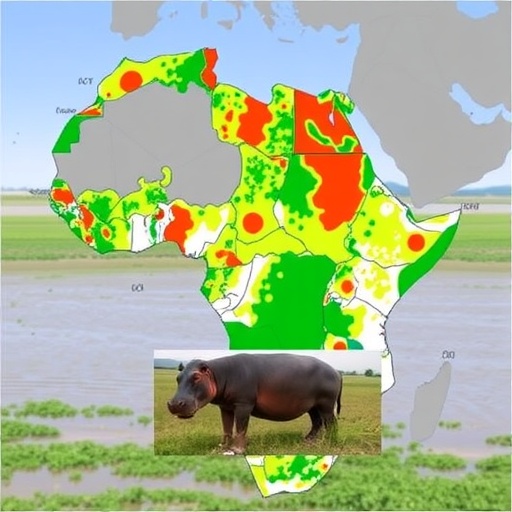In a groundbreaking study focused on the endangered hippopotamus species, researchers conducted an in-depth habitat suitability assessment in Ethiopia’s Southern Rift Valley. The paper, authored by Oka, Tomass, and Takele, aims to highlight effective conservation strategies for these majestic creatures using sophisticated Geographic Information Systems (GIS) and multi-criteria decision analysis (MCDA) methodologies. With rapid environmental changes and human encroachment threatening their natural habitats, understanding these dynamics becomes pivotal for the preservation of hippopotamus populations.
The hippopotamus, scientifically known as Hippopotamus amphibius, is one of Africa’s iconic mammals. Known for their massive size and unique lifestyle, hippos spend most of their days submerged in water bodies, which helps them regulate their temperature. However, with habitat loss due to agriculture and urbanization, their survival is increasingly jeopardized. The Southern Rift Valley of Ethiopia, rich in biodiversity, has emerged as a crucial habitat for these animals, thus making it an ideal area for conducting habitat suitability assessments.
This research meticulously examines various environmental factors that contribute to the well-being of hippopotamus populations in the Southern Rift Valley. Utilizing GIS tools, the researchers mapped the geographical distribution of suitable habitats while integrating multiple criteria such as water availability, vegetation cover, human population density, and agricultural land use. This multi-faceted approach allows for a nuanced understanding of the habitat requirements necessary for sustaining healthy hippopotamus populations.
One of the most significant aspects of this study is the emphasis on data-driven decision-making. The researchers collated extensive datasets, drawing both qualitative and quantitative information to evaluate habitat conditions across different regions. The methodology adopted not only provided clear insights into suitable habitats but also underscored the importance of evidence-based strategies in conservation efforts. By employing MCDA techniques, the authors were able to weigh various factors against one another, ensuring a comprehensive analysis of habitat suitability.
The findings of the study reveal that certain areas of the Southern Rift Valley exhibit higher suitability for hippos, primarily due to the presence of ample water sources and lush vegetation. These findings have critical implications for conservation efforts, guiding stakeholders in prioritizing regions for protection and restoration. Furthermore, the study discusses the potential impacts of climate change, highlighting the need to consider future scenarios when planning for habitat conservation.
Conservation of the hippopotamus is not merely a matter of safeguarding individual species; it is about maintaining the ecological balance in the regions they inhabit. As keystone species, hippos play a vital role in their ecosystems by creating water channels that facilitate aquatic plant growth, which in turn supports diverse wildlife. The loss of hippos can lead to a cascade of effects within these ecosystems, underscoring the urgency of implementing appropriate conservation measures.
In drawing attention to these issues, the research advocates for collaborative management practices among governmental, non-governmental, and local communities. Engaging local populations in conservation efforts is crucial for creating sustainable strategies that benefit both the humans and wildlife sharing these environments. The researchers argue that without local involvement, conservation efforts run the risk of failure due to lack of community support and understanding.
While the study predominantly focuses on habitat suitability, it also raises concerns regarding human-wildlife conflicts that can arise as populations increase or shift due to habitat loss. Developing strategies to mitigate these conflicts is essential. The researchers propose integrated land-use planning and community awareness campaigns as essential components to reduce tensions between humans and hippos, especially in areas where agriculture expands into traditional habitats.
With the role of technology becoming increasingly vital in conservation, this study exemplifies the power of GIS and remote sensing in modern ecological research. The ability to visualize data spatially provides invaluable insights that are crucial for decision-making. Moreover, these technologies enable conservationists to monitor environmental changes over time, making it easier to adapt strategies based on emerging data.
The researchers acknowledge that while their findings are significant, further studies are necessary to fully understand the dynamics influencing hippo habitats across Ethiopia and other African regions. Continuous monitoring and assessment will help adapt conservation strategies to address ongoing challenges, including climate change, poaching, and habitat modification.
Overall, this meticulous research serves as a potent reminder of the fragility of ecosystems and the need for proactive measures to conserve wildlife. The hippo, a symbol of strength and resilience, is facing unprecedented challenges that require immediate attention from scientists, policymakers, and the general public. Through targeted conservation efforts informed by robust data, there is hope for the future of hippos in Ethiopia’s Southern Rift Valley and beyond.
As we navigate an increasingly complex relationship with nature, studies like this provide the foundation for sustainable practices that balance ecological integrity with human development. The call to action is clear: enact conservation strategies now before it’s too late. Understanding the needs of species like the hippopotamus is a critical step in fostering a harmonious coexistence, ensuring that future generations can appreciate these incredible animals in their natural habitats.
To summarize, the groundbreaking research conducted in Ethiopia highlights the intrinsic value of integrating advanced technologies and community engagement into conservation strategies. By focusing on the habitat suitability of Hippopotamus amphibius, the authors pave the way for a new era of data-driven wildlife conservation that prioritizes both ecological health and community welfare. This approach is essential for ensuring the survival of not only hippos but the rich biodiversity of the regions they inhabit.
Subject of Research: Habitat suitability assessment for hippopotamus conservation
Article Title: Habitat suitability assessment for hippopotamus (Hippopotamus amphibius) conservation using GIS-based multi-criteria decision analysis in Ethiopia’s Southern Rift Valley.
Article References:
Oka, S.O., Tomass, Z., Takele, S. et al. Habitat suitability assessment for hippopotamus (Hippopotamus amphibius) conservation using GIS-based multi-criteria decision analysis in Ethiopia’s Southern Rift Valley.
Environ Monit Assess 197, 1276 (2025). https://doi.org/10.1007/s10661-025-14734-8
Image Credits: AI Generated
DOI:
Keywords: Habitat suitability, hippopotamus, conservation, GIS, multi-criteria decision analysis, Ethiopia, Southern Rift Valley.




